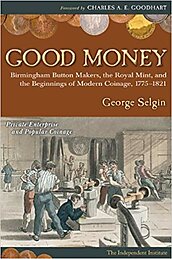A fascinating story of the important yet virtually unknown episode in the history of money, this history chronicles the British manufacturers’ challenge to the Crown’s monopoly on coinage. In the 1780s, when the Industrial Revolution was gathering momentum, the Royal Mint failed to produce enough small-denomination coinage for factory owners to pay their workers. As the currency shortage threatened to derail industrial progress, manufacturers began to mint custom-made coins, called “tradesman’s tokens,” which served as the nation’s most popular currency for wages and retail sales until 1821, when the Crown outlawed all moneys except its own. This book not only examines the crucial role of private coinage in fueling Great Britain’s Industrial Revolution, but also sheds light on contemporary private-sector alternatives to government-issued money, such as digital monies, cash cards, electronic funds transfer, and—outside of the United States—spontaneous “dollarization.”
Good Money: Birmingham Button Makers, the Royal Mint, and the Beginnings of Modern Coinage, 1775–1821
About the Book
About the Author
George Selgin is a senior fellow and director of the Center for Monetary and Financial Alternatives at the Cato Institute and Professor Emeritus of Economics at the University of Georgia. His research covers a broad range of topics within the field of monetary economics, including monetary history, macroeconomic theory, and the history of monetary thought.
